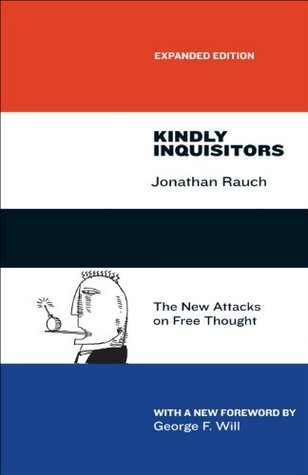More on this book
Community
Kindle Notes & Highlights
Read between
February 5 - November 28, 2021
The only reliable way to identify prejudice is through public critical exchange. If you want to think you’re unprejudiced, you must do something: science.
the only-minorities-can-understand argument is anti-intellectualism at its most rancid. It is the age-old tribalist notion that, as Popper put it, “we think with our blood,” “with our national heritage,” or “with our class.”
A basic principle of science—of liberal social life—is that we kill our hypotheses rather than each other. Propositions are punished instead of their proponents.
If the fundamentalist mindset has one ugly trait, it is the impulse to punish the believer along with the belief.
The search for error will become a search for unorthodoxy.
Competitive and consensual public checking of each by each through criticism and questioning is the only legitimate way to decide who is right.
“A rabbi whose community does not disagree with him is not really a rabbi, and a rabbi who fears his community is not really a man.”
Though I have been told that I am “sick,” though my feelings have suffered, I live a far fuller and happier life than I could in a society where powerful people’s feelings were protected by an inquisition.
What hurts us is not wrong-thinking people but propaganda and ignorance; and unfettered criticism—liberal science—is the cure, not the disease.
As long as the game of science produces losers along with winners, as long as unfettered criticism makes people angry and hurt—so long will the enemies of liberal inquiry persist.
Without public checking, there is no way to know, even in principle, whether the man scribbling alone in his room is Einstein or a lunatic.
“One man’s experience is nothing if it stands alone,” said Peirce. “If he sees what others cannot, we call it hallucination. It is not “my” but “our” experience that has to be thought of; and this “us” has indefinite possibilities.”
Hypotheses provide raw material; competition to withstand the rigors of public criticism then weeds out the many errors, and what survives on any given day is our knowledge. As in biological evolution, we cannot assume that any result is final.
Knowledge is abstract: propositions, ideas, concepts. Nonetheless, it is real.
Nothing is guaranteed among ornery humans, but, generally and over longer spans, you can look at a tape of a liberal society’s moral development and know which way it is running: usually toward less social violence, more social participation, and a wider circle of dignity and toleration.
But humanity is unique in its ability to develop morally as a species, over the arc of many lifetimes. The greater miracle, then, is not the moral law within us but the moral knowledge without.
The case for hate-speech prohibitions mistakes the cart for the horse, imagining that anti-hate laws are a cause of toleration when they are almost always a consequence.
By the time a community is ready to punish intolerance legally, it will already be punishing intolerance culturally. At that point, turning haters into courtroom martyrs is unnecessary and often counterproductive.
“Denial of equality of opportunity is immoral.”
“If your god condemns people like me for the crime of loving,” Kameny would say, “then your god is a false and bigoted god.”
He and others saw Jerry Falwell and Anita Bryant not as threats to hide from but as opportunities to be seized: opportunities to rally gays, educate straights, and draw sharp moral comparisons. “Is that what you think this country is all about? Really?”
Most of us, however, are not Galileos or Einsteins, or Sakharovs or Kings. Most of us don’t need to be. We need only a few Kamenys, plus a system that is very good at testing and rejecting bad hypotheses and at bringing forward better ones.
The answer to bias and prejudice is pluralism, not purism. The answer, that is, is not to try to legislate bias and prejudice out of existence or to drive them underground, but to pit biases and prejudices against each other and make them fight in the open.
I believe the hope of living in a world free of discrimination and prejudice is a utopian pipe dream, and is as anti-human and dangerous as most utopian pipe dreams.
The open society is sometimes a cross we bear, but it is also a sword we wield, and we are defenseless without it.
Frank Kameny, an irascible man with a capacious conscience, had it right. In more than fifty years of activism, he never called for silencing or punishing those he disagreed with, but he never cut them any argumentative slack, either.


